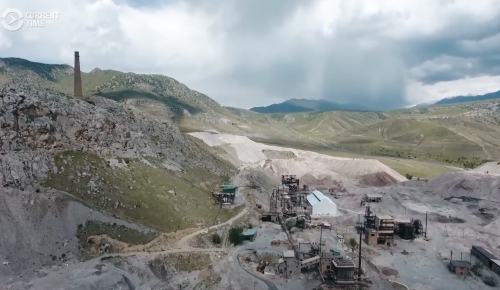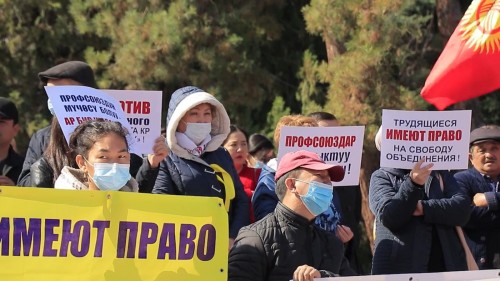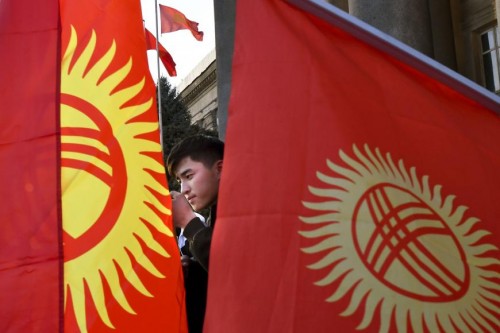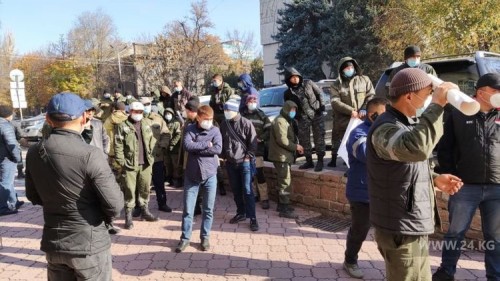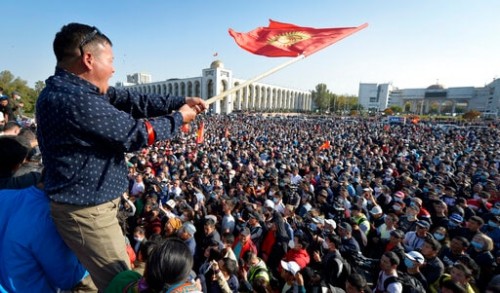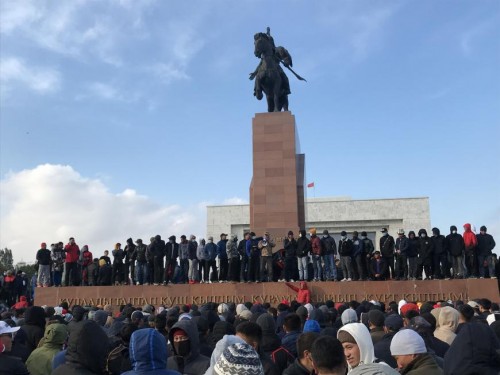Countries
Solidarity campaigns
13 August 2024
Georgia: Support striking workers at Evolution Gaming
5 June 2023
Georgia: Justice for Wolt couriers
10 May 2023
Belarus: Trade union activity is not extremism!
2 November 2019
Kazakhstan: Trade unionist Erlan Baltabay imprisoned - again!
19 November 2018
Kazakhstan: Stop repression and physical attacks on leaders of independent unions; hands off Larisa Kharkova, Erlan Baltabai and Dmitriy Senyavskiy
18 April 2018
MALOKHAT STILL NEEDS YOUR HELP
News
30 July, 2021 / kyrgyzstan
Kyrgyz Heavy Metal: Inside The Mercury Mine Of Aidarken
The huge mercury mine at Aidarken in Kyrgyzstan once supplied the entire Soviet Union. It now produces a fraction of its former output, with many of its shafts still filled with floodwaters that took it out of service from 2009 to 2019.
13 July, 2021 / kyrgyzstan
URGENT APPEAL TO THE PRESIDENT OF THE KR MR. JAPAROV S.N.
Bir Duino and partners propose to conduct a joint National Dialogue-Forum for Partnership for the Development of the Kyrgyz Republic in autumn of 2021 to prevent risks, conflicts and disasters, promote gender equality and gender justice, and support reforms to build the rule of law without discrimination and violence in the future. We look forward to equal dialogues, partnership discussions and joint programs to strengthen civil society without discrimination and violence. We believe that the President will revise all bills adopted by the illegitimate parliament of the Kyrgyz Republic, we currently work on development of strategies of litigation with the parliament of the KR to restore the rights and freedoms of citizens in Kyrgyzstan, as the right of citizens to freedom of association and assembly is the basis for successful development of the country, ensuring security and increasing development opportunities and citizen participation in government. People are primary, power is secondary.
01 June, 2021 / kyrgyzstan
Kyrgyzstan: controversial trade union law vetoed
The law on trade unions that would seriously undermine freedom of association in Kyrgyzstan and deprive unions of their independence was vetoed by the President on 27 May.
05 March, 2021 / kyrgyzstan
PUBLIC CALL FROM BIR BUINO KYRGYZSTAN TO MARIPOV U.A., PRIME-MINISTER OF THE KR
We have carefully reviewed the 100-day Plan of the Government of the Kyrgyz Republic. We welcome the new steps to improve social and economic situation of the country. We hope that you will take into consideration the recommendations that concern vulnerable groups of citizens who have been waiting for years, since the revolutions, decision-making process one the part of new authorities, with equal participation of activists from the communities to the national levels. We kindly request you to focus attention on labor inequality and importance of partnership of government and business with independent trade unions to protect the rights of workers, living in the Kyrgyz Republic and abroad. It is important to urgently abolish the list of prohibited professions for women.
25 December, 2020 / kyrgyzstan
Kyrgyzstan: Increased Interference in Trade Union Activities
Kyrgyz authorities have increased their scrutiny of trade union members of the federation over the last year. In October 2019, parliament formed a commission tasked with the vague mandate of “studying the implementation of the trade union law” in Kyrgyzstan. Eldiyar Karachalov, chair of the trade union of construction workers, a union member of the federation, said that the commission asked trade union leaders to provide extensive information about their organizational, financial, and economic activities.
30 October, 2020 / kyrgyzstan
Kyrgyzstan: Severelectro employees demand dialogue with management
Protesting employees of Severelectro OJSC demand from the Chairman of the National Energy Holding, Aitmamat Nazarov, to come out to them for a dialogue. About 70 fitters and electricians of the company took part in a protest because of their disagreement with the appointment of the new director of the company Ulan Astarkulov.
09 October, 2020 / kyrgyzstan
KYRGYZSTAN: CIVIL SOCIETY APPEALS FOR DIALOGUE, RESPECT FOR HUMAN RIGHTS AND THE RULE OF LAW IN THE CURRENT TIMES OF TURMOIL
Members of the Civic Solidarity Platform (CSP) – a network of human rights NGOs from across Europe, the former Soviet Union and North America – express our support and solidarity with Kyrgyzstan’s civil society in its efforts to ensure respect for human rights and the rule of law at this time of political crisis and upheaval in the Central Asian country. We call on the authorities of Kyrgyzstan, as well as on all the groups staking claims on power to opt for dialogue and cooperation, refrain from violence, and act strictly within the framework of national and international law with a view to overcoming the current uncertainty, power struggles and threats of lawlessness and to continuing the course of democratic development.
07 October, 2020 / kyrgyzstan
KYRGYZSTAN: RESPECT RIGHTS WHILE RESTORING ORDER
Law enforcement forces in Kyrgyzstan responding to protests and unrest should uphold human rights and the rule of law, including if provoked by some protesters, Human Rights Watch said today. Clashes between protesters and law enforcement on the evening of October 5, 2020, following the flawed October 4 parliamentary election, led to significant casualties, including 1 death and 164 hospitalizations, according to health officials cited in local media.
07 October, 2020 / kyrgyzstan
Appeal of Bir Duino–Kyrgyzstan and the solidarity network: "Kyrgyzstan is in Danger!"
Given the acute conflict situation that has developed after the fraudulent elections, realising all the threats to the security of the citizens, the state and its economy, we urge all political groups to put aside their personal ambitions and unite all progressive forces to take urgent measures to ensure a peaceful transition, to prevent the further spread of violence and destabilization in the country.We call on all political forces to act within the framework of the constitution to start the process of legitimizing the post-election situation and the peaceful transition of power in accordance with the Constitution of the Kyrgyz Republic and its international obligations. We understand the legitimate demands of the protesters who do not agree with the use of administrative resources and falsification of the elections results, the violent use of rubber bullets, tear gas and stun grenades by law enforcement agencies, when a young activist Altynbek uulu Umutbek died at the age of 19 and over 600 people were injured, more than a hundred of them are in hospitals.
06 October, 2020 / kyrgyzstan

